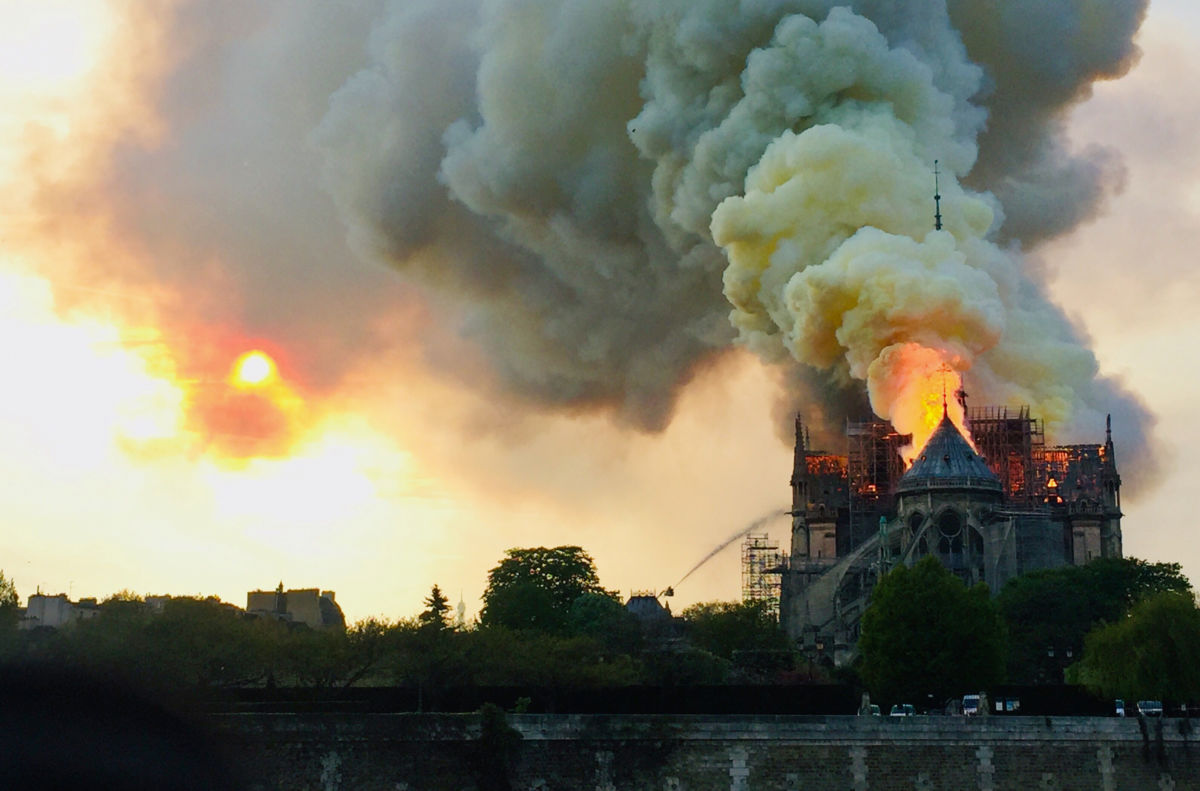Honest, paywall-free news is rare. Please support our boldly independent journalism with a donation of any size.
When Notre Dame burned, I mourned. A beautiful cathedral, a destination, a sanctuary for quiet invocation, Notre Dame was also an architectural gem, a landmark for more than 850 years. The collapse of its beautiful spire was heartbreaking to see. I am glad that the world stopped, recognized that the fire that engulfed the cathedral roof was a significant loss to us all, and gathered, albeit virtually, to bear witness.
While I felt sad as I watched news coverage of the Paris event, as a woman of color, I couldn’t help but also feel a certain indignation, a kind of anger, an unexpressed rage. The kind of unexpressed rage that, for over 400 years, Black folks have just swallowed like a communion wafer in pursuit of infinite grace.
My sadness mixed with resentment partly because, stretching over a 10-day period in one rural Louisiana town just last month, three Black churches burned to the ground. Officials recently arrested a white man, Holden Matthews, the son of a parish deputy sheriff, and charged him with a hate crime. This one case is enough to spark sorrow, but it is not the sole reason for my consternation.
The list of documented cases of African American churches attacked by arsonists is long – and on that long list there are, of course, only the cases that have been documented. How many other places dedicated to the liberation of the Black spirit have been incinerated over the centuries? In just over one year, from 1995 to 1996, so many Black churches were attacked by fire that Congress passed the Church Arson Prevention Act.
As I watched the international coverage of Notre Dame, a chant echoed in my head: Black churches also matter. This was a response to lopsided news coverage that centers white spaces. There is real injury in the Notre Dame story, and a macabre, surreal irony, too: Black bodies bled to provide those spaces where whiteness is centered.
While construction of Notre Dame was completed in 1345, in 1789, the cathedral was pillaged by Parisians animated by the French Revolution and subsequently fell into ruin until Napoleon gave control of Notre Dame back to the Catholic Church in 1801 and repair work on the cathedral began. It is not a coincidence that this period through the 18th and 19th centuries coincides with French investment in the transatlantic slave trade and France’s colonialist theft of resources — human and otherwise — throughout Africa, Asia, North America and the Caribbean. The commodification of Black and Brown bodies filled French coffers.
In its possession of Haiti alone, France controlled the most prosperous colony in the world, Saint-Dominique, as it was called before the Black-led revolution that freed stolen Africans from the torture of slave labor. The Black bodies in this French colony provided 40 percent of the sugar and 60 percent of the coffee imported by Europe. While the French sipped their morning beverage in peace, enslaved Africans suffered in conditions so deadly the importation of 800,000 humans to the colony was required to compensate for loss of life and meet Europe’s consumerist demands. Black bodies bore the evidence of France’s monstrous torture, as the Guardian details:
“Have they not hung up men with heads downward, drowned them in sacks, crucified them on planks, buried them alive, crushed them in mortars?” wrote one former slave. “Have they not forced them to eat excrement? Have they not thrown them into boiling cauldrons of cane syrup? Have they not put men and women inside barrels studded with spikes and rolled them down mountainsides into the abyss?”
Even after Napoleon’s military defeat in Haiti, the neocolonialist exploitation of Haitians continued. In a sickening twist of injustice that privileged the French elite, Black bodies were actually forced to pay reparations to France, starting in the 1800s, through the early 20th century, and as late as 1947.
And this is just one island. Who can add, multiply and compound the interest on France’s global exploitation of people of color?
French imperialism enabled projects like the restoration of Notre Dame during Europe’s Age of Enlightenment, which was also the colonial era and the era of the transatlantic slave trade. Today, wealthy benefactors have already pledged nearly $800 million to restore Notre Dame, a colossal task to be underwritten by an elite few in this era of income inequality, this era concretized by the rise of the 1%, this neocolonial era.
Prior to the Notre Dame fire, the Louisiana churches that Holden Matthews is charged with destroying had raised about $50,000 in donations to help rebuild. After Notre Dame, contributions rose to $1.8 million. These gifts are beautiful, an expression of infinite grace. They likely came from plenty of regular folks, and they are not reparations.
As we sing “Ave Maria,” sing also for Black churches set aflame by racialized hate. While some justifiably interrogate French billionaires who have committed to rebuilding Notre Dame but never met with French Yellow Vests who have been protesting for a path out of poverty, not enough of us are questioning the source of the wealth that enabled the privilege of Notre Dame in the first place: So many Black and Brown bodies splayed, maimed, raped and then blithely consumed in every early-morning French cafe.
Media that fights fascism
Truthout is funded almost entirely by readers — that’s why we can speak truth to power and cut against the mainstream narrative. But independent journalists at Truthout face mounting political repression under Trump.
We rely on your support to survive McCarthyist censorship. Please make a tax-deductible one-time or monthly donation.
